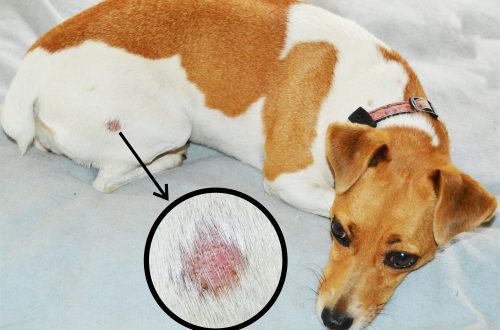
Tá fual ag an madra le fuil: cad atá le déanamh
This can happen to any breed of dog, and if it does, there’s no need to panic. Blood in the urine of a dog is a frightening sight, but in many cases it is treated. It can be caused by a simple urinary tract infection or prostate problems (in males).
Hematuria is the scientific name for blood in the urine in dogs. It can be caused by an inflammation or infection of the urinary system, affecting the upper or lower urinary tract. If a dog has blood in its urine, it should be taken to a veterinarian to diagnose the cause and receive recommendations to help the pet.
The most common causes of blood in the urine of a dog, what to do if this happens, and treatment methods – later in the article.
Clár ábhair
Blood in the urine of a dog: causes of diseases of the upper urinary tract
Like humans, the dog’s upper urinary tract includes two kidneys. Blood in the urine, formed in this part of the urinary tract, is a pathology of the kidneys. The causes of bleeding from the upper urinary tract are as follows:
Idiopathic renal hematuria. This is the excretion of blood by the kidneys into the urine for an unknown reason. This may be due to medication, an infection, or a problem with the immune system. Most often, this is a hereditary kidney disease.
Ionfhabhtú duáin. If a dog is urinating blood, one or both of its kidneys may be infected.
Clocha sna duáin. Kidney stones in dogs can affect one or both kidneys, resulting in blood in the urine.
Ailse duáin. This disease is rare in dogs. But with a lesion, we can see blood in the urine. Cancer can be localized only in the kidneys or spread to other organs.
Renal telangiectasia. Some dog breeds, such as the Welsh Corgi, are genetically predisposed to spontaneous dilation of blood vessels in the kidneys, which can lead to blood in the urine.
Blood in the urine of a dog: causes of diseases of the lower urinary tract
The lower urinary tract includes the bladder and urethra, the tube that carries urine out of the body. The causes of bleeding in this area may be as follows:
- Bladder infection. A lower urinary tract infection, or UTI, is by far the most common cause of blood in a dog’s urine. It can be caused by skin allergies, the anatomy of the urethra, vulva, or foreskin, and hormonal urinary incontinence in neutered dogs.
- Clocha sa lamhnán. They can form for a variety of reasons, including genetic factors, diet, and chronic infection.
- Ailse na lamhnán. Symptoms of bladder cancer in dogs are often similar to those of a UTI. This disease can lead to “little troubles” in the home – urinary incontinence, difficulty urinating and blood in the urine.
- Problems with the prostate. Benign prostate enlargement and prostate infection are the most common prostate problems in intact males.
Causes of blood in a dog’s urine, which can affect both the upper and lower urinary tract, include rupture of the bladder as a result of an injury caused by a car accident or an attack by another dog. Causes also include coagulopathy, the scientific term for problems with blood clotting, and vasculitis, inflammation of the blood vessels.
The dog has blood in the urine: treatment and diagnosis
If the dog urinates with blood, it is necessary to visit a veterinarian as soon as possible. As a general rule, any dog that urinates for the first time with blood should be examined by a veterinarian within the first 24 hours.
During the appointment, the specialist will try to diagnose the root cause of the blood by taking a urine sample from the dog. A urine culture test may be needed to check if the problem is caused by bacteria. The doctor can also take a blood test, take an x-ray, or perform an ultrasound diagnosis.
Treatment will depend on the specific cause of the bleeding. If the problem is due to bacteria, the doctor may prescribe antibiotics. In case of benign enlargement or neoplasia of the prostate, he will probably recommend castration of the male. He may suggest surgery if he finds that blood in the urine is caused by bladder stones or other problems. Veterinarians in such cases usually prescribe anti-inflammatory or pain medications for the dog.
Your veterinarian may recommend a change in food. Nutrition is an important element in controlling urinary tract problems in dogs. Moist food helps dilute urine, and several nutrients help reduce stone formation and optimize urine pH.
Prevention of urinary problems
Regular veterinary checkups are the best way to prevent blood in the urine and other urinary problems. The specialist will tell you if the dog is predisposed to problems with urination. If this is the case, he will recommend periodic urine tests to make sure that everything is in order with her health.
It should be remembered that as convenient as it is to simply let the pet out into the backyard so that he does his own business there, monitoring the process of urinating a dog is sometimes a necessary element of caring for his health. Leaving a problem such as blood in the urine unattended can lead to more serious consequences. The owner is the main protector of the health of the pet, so you need to carefully monitor him and discuss the results of your observations with a veterinarian. Love and attention will help the dog to remain happy and healthy for many years.






